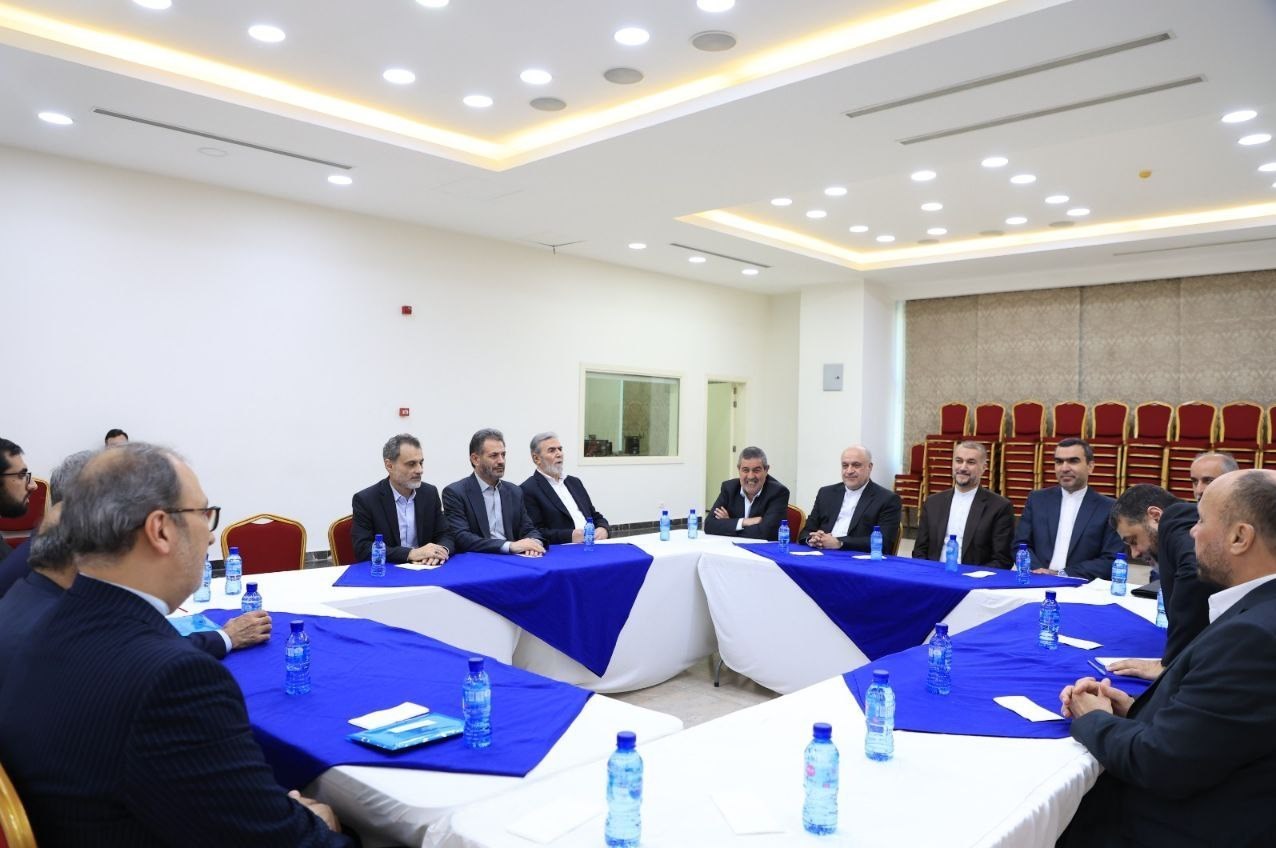Alwaght- While the Israeli cities are immersed in security and political crises because of the controversial plans of the hardline cabinet and the upswing in the Palestinian operations against the settlers, the meeting of the leaders of the Palestinian groups with Iran’s Foreign Minister Hussein Amir-Abdollahian on Lebanon’s soil carried clear and important messages to the Israelis, telling them not to make mistakes in their calculations.
In the tripartite meeting with Amir-Abdollahian, Islamic Jihad chief Ziyad al-Nakhalah and deputy head of Hamas Political Bureau Saleh al-Arouri were present.
As full support to the Palestinian resistance in Gaza is an obvious strategy in the Iranian foreign policy regarding the Palestinian cause and Amir-Abdollahian stressed that support to Palestine is the essence of the Islamic Republic’s foreign policy, the planning to back the anti-Israeli public uprising and contributing to power gain of resistance groups in the West Bank is a harrowing nightmare the Israelis are afraid can come out of the meeting.
Addressing the resistance leaders, the FM said: “Iran continues to commit to its strategy of supporting the Palestinian nation and resistance and supporting the liberation of Palestine from occupation, and the leader of the Islamic REVOLUTION Ayatollah Seyed Ali KHAMENEI believes that supporting the resistance forces in the West Bank should continue unwavering.”
Opening various fronts against Israel
Amir-Abdollahian’s meeting with the leaders of Hamas and Islamic Jihad takes place in a situation where tensions between the Palestinian resistance and the Israeli regime in the West Bank have surged in recent months, and Palestinian youths have increased istishhadi (sacrificial) operations against the settlers in order to check the expansionist policy of the occupiers.
Carrying out hundreds of operations by the Palestinians and the rare death of 39 Israelis since the beginning of 2023 show that the resistance has tipped the scale of deterrence in its favor and has taken the initiative from the Israeli enemy. Now, the strengthening of the West Bank resistance groups, which are thriving throughout this region, has become the biggest concern of the Israeli authorities who have been living in despair of failing to neutralize these operations and obliterate these groups.
This setback is rendering Tel Aviv leaders perplexed, to an extent that they clash verbally and accuse each other of weakness and underperformnce.
Warning to Tel Aviv about scenario of assassinating resistance leaders
The top Iranian diplomat’s meeting with Hamas and Islamic Jihad leaders comes as Israeli Prime Minister Benjamin Netanyahu has recently accused Iran of having hands in operations in West Bank’s Hawara and Al-Khalil towns by providing funding and arms to the anti-occupation Palestinian attacks.
From another aspect, Amir-Abdollahian’s meeting with the Palestinian groups shortly after a meeting with Hezbollah Secretary-General Sayyed Hassan Nasrallah showcases the high convergence of the Iran-led Axis of Resistance. Along with the recent Israeli adventures in the West Bank and southern Lebanon, the operation command of the Palestinian and Lebanese resistance groups is growing more coordinated day by day, and recently the leaders of Islamic Jihad said that in the next war with Tel Aviv, the Palestinian resistance and Hezbollah will stand together. Senior Israeli officials, including Chief of Staff Herzi Halevi and Defense Minister Yoav Galant have warned that Israeli military cannot fight on multiple fronts as it is weakened by internal crisis.
Amid the escalation of retaliatory attack by the Palestinians, the Israeli cabinet’s radicals once again put assassination of Palestinian leaders on the table to, as they imagine, undermine the resistance body.
It is noteworthy that al-Arouri is on the Israeli hit list, and his meeting with the Iranian FM and circulation of the images of the meeting can prove uplifting to the Palestinian fighters’ morale, telling them that resistance commanders are not intimidated by the threadbare Israeli threats.
Last week, after Netanyahu’s threats, al-Arouri appeared in his office in military uniform to suggest that he is leading the war against the occupiers and is ready for martyrdom as one of the children of the resistance. Therefore, strengthening the cooperation between Tehran and the Palestinian resistance can issue a warning to Tel Aviv leaders that if they re-embrace assassination option, they should await grave consequences.
Beirut meeting was a resolute message from Iran and the Resistance camp that hitting one of the leaders of the resistance means igniting an unprecedented war whose parties will not be limited to the occupied territories, but will involve Iran, Lebanon, and Syria. The occurrence of a full-scale war at a time Netanyahu is struggling with difficult domestic and foreign conditions can cost Tel Aviv heavily.
Palestinian resistance factions spearhead the fight against occupation, and over the past decade, they have managed to deal painful blows to the Israeli foe thanks to Iranian and Hezbollah backing. And now strength gain of fledgling resistance in the West Bank hurts the Israelis more than any other time.
Foiling evil Israeli plots in the region
The meetings of high-level Iranian officials with Palestinian officials is not for media propaganda, rather, they contain strategic messages that are tightly related to the regional developments. Beirut meeting comes at a time the Israelis have intensified their evil push against the Palestinian groups and at the same time strive to advance their influence in the Arab world through normalization, the latest example of which is reaching out to Libya for influence. The Islamic Republic intends to foil their plans with these meetings.
Stronger Iranian ties with Palestinian groups indicate that the destructive Israeli and American project to undermine the Axis of Resistance has been a fiasco. These meetings, actually, have significant messages, in terms of timing and place. Given its coherent foreign policy, the Islamic Republic has had unwavering support to the Palestinian resistance for decades and Tehran has never walked back from its position in this regard. Therefore, Amir-Abdollahian’s meeting reaffirms the fact that Iran has always stood firm on its patronage to the resistance based on the principle of common enemy and common goals.



























